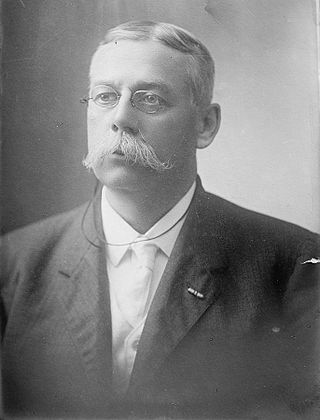
Francis Emroy Warren was an American politician of the Republican Party best known for his years in the United States Senate representing Wyoming and being the first Governor of Wyoming. A soldier in the Union Army during the American Civil War, he was the last veteran of that conflict to serve in the U.S. Senate.

Edward Hill was an officer in the United States Army during the American Civil War. He received the Medal of Honor.
Aaron Blake Tompkins was a cavalry soldier who received the Medal of Honor while serving in the Union Army during the American Civil War.

John H. Ferrell was a civilian employee of the Union Navy during the American Civil War and a recipient of the United States military's highest decoration, the Medal of Honor. He is one of only eight civilians ever to receive the U.S. Medal of Honor.
Lieutenant Charles L. Barrell was an American soldier who fought in the American Civil War. Barrell was awarded the country's highest award for bravery during combat, the Medal of Honor, for his action near Camden, South Carolina, in April 1865.
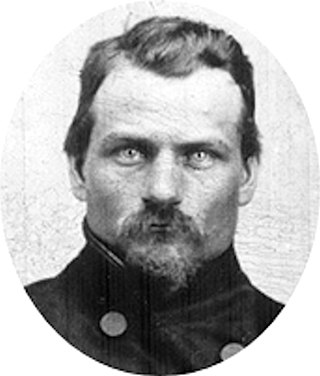
Edward J. Bebb was an American soldier who fought in the American Civil War. Bebb was awarded the country's highest award for bravery during combat, the Medal of Honor, for his action in Columbus, Georgia on April 16, 1865. He was honored with the award on June 17, 1865.
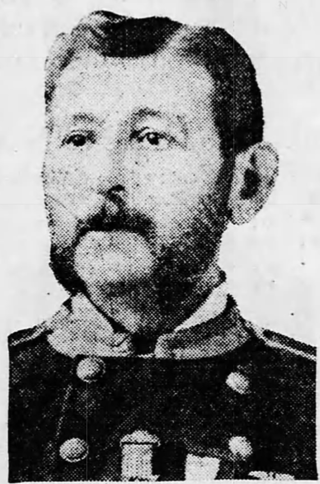
Private Orlando Emanuel Caruana was a Maltese-born American soldier who fought in the American Civil War. Caruana received the country's highest award for bravery during combat, the Medal of Honor, for his action during the Battle of New Bern in North Carolina on March 14, 1862, and the Battle of South Mountain in Maryland on September 14, 1862. He was honored with the award on November 14, 1890.
First Lieutenant James Isaac Christiancy was an American soldier who fought in the American Civil War. Christiancy received the country's highest award for bravery during combat, the Medal of Honor, for his action at Hawes Shops, Virginia on 28 May 1864. He was honored with the award on 10 October 1892.
Second Lieutenant Josiah M. Curtis was an American soldier who fought in the American Civil War. Curtis received the country's highest award for bravery during combat, the Medal of Honor, for his action during the Third Battle of Petersburg in Virginia on 2 April 1865. He was honored with the award on 12 May 1865.
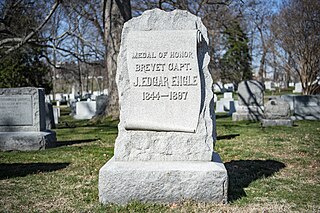
Sergeant James Edgar Engle was an American soldier who fought in the American Civil War. Engle received the country's highest award for bravery during combat, the Medal of Honor, for his action during the Bermuda Hundred Campaign in Virginia on 18 May 1864. He was honored with the award on 17 December 1896.
Private Coron D. Evans was an American soldier who fought in the American Civil War. Evans received the country's highest award for bravery during combat, the Medal of Honor, for his action during the Battle of Sayler's Creek in Virginia on 6 April 1865. He was honored with the award on 3 May 1865.
Private John C. Ewing was an American soldier who fought for the United States in the American Civil War. Ewing received the country's highest award for bravery during combat, the Medal of Honor, for his action during the Third Battle of Petersburg in Virginia on 2 April 1865. He was honored with the award on 20 May 1865.
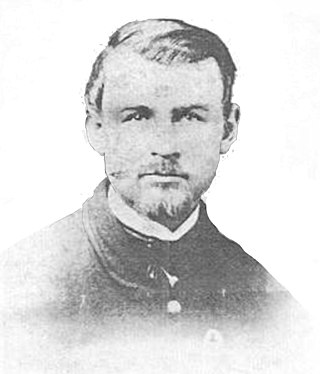
Sergeant Charles Stuart Fall was an American soldier who fought in the American Civil War. Fall received the country's highest award for bravery during combat, the Medal of Honor, for his action during the Battle of Spotsylvania Court House in Virginia on 12 May 1864. He was honored with the award on 13 May 1899.
Sergeant Augustin D. Flanagan was an American soldier who fought in the American Civil War. Flanagan received the country's highest award for bravery during combat, the Medal of Honor, for his action during the Battle of Chaffin's Farm in Virginia on 29 September 1864. He was honored with the award on 6 April 1865.
Corporal Trustrim Connell was an American soldier who fought in the American Civil War. Connell received the country's highest award for bravery during combat, the Medal of Honor, for his action during the Battle of Sayler's Creek in Virginia on 6 April 1865. He was honored with the award on 10 May 1865.
Private Michael Dougherty was an Irish soldier who fought in the American Civil War. Dougherty received the country's highest award for bravery during combat, the Medal of Honor, for his action at Jefferson, Virginia, on 12 October 1863. He was honored with the award on 23 January 1897.
John Chapman was a French soldier who fought in the American Civil War. Chapman received the United States' highest award for bravery during combat, the Medal of Honor, for his action during the Battle of Sayler's Creek in Virginia on 6 April 1865. He was honored with the award on 10 May 1865.
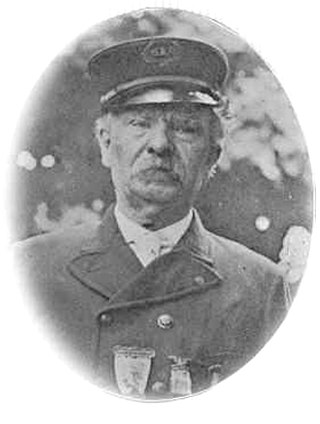
Private Nicholas Fox was an American soldier who fought in the American Civil War. Fox received the country's highest award for bravery during combat, the Medal of Honor, for his action during the Siege of Port Hudson in Louisiana on 14 June 1863. He was honored with the award on 1 April 1898.








